Seizure Guard
Seizure Guard
Seizure Guard
Enhancing Epilepsy Management: A Case Study on Developing the SeizureGuard App
Enhancing Epilepsy Management: A Case Study on Developing the SeizureGuard App
Enhancing Epilepsy Management: A Case Study on Developing the SeizureGuard App
HFES 2024 mHealth Student Competition Winning Project
HFES 2024 mHealth Student Competition Winning Project
HFES 2024 mHealth Student Competition Winning Project
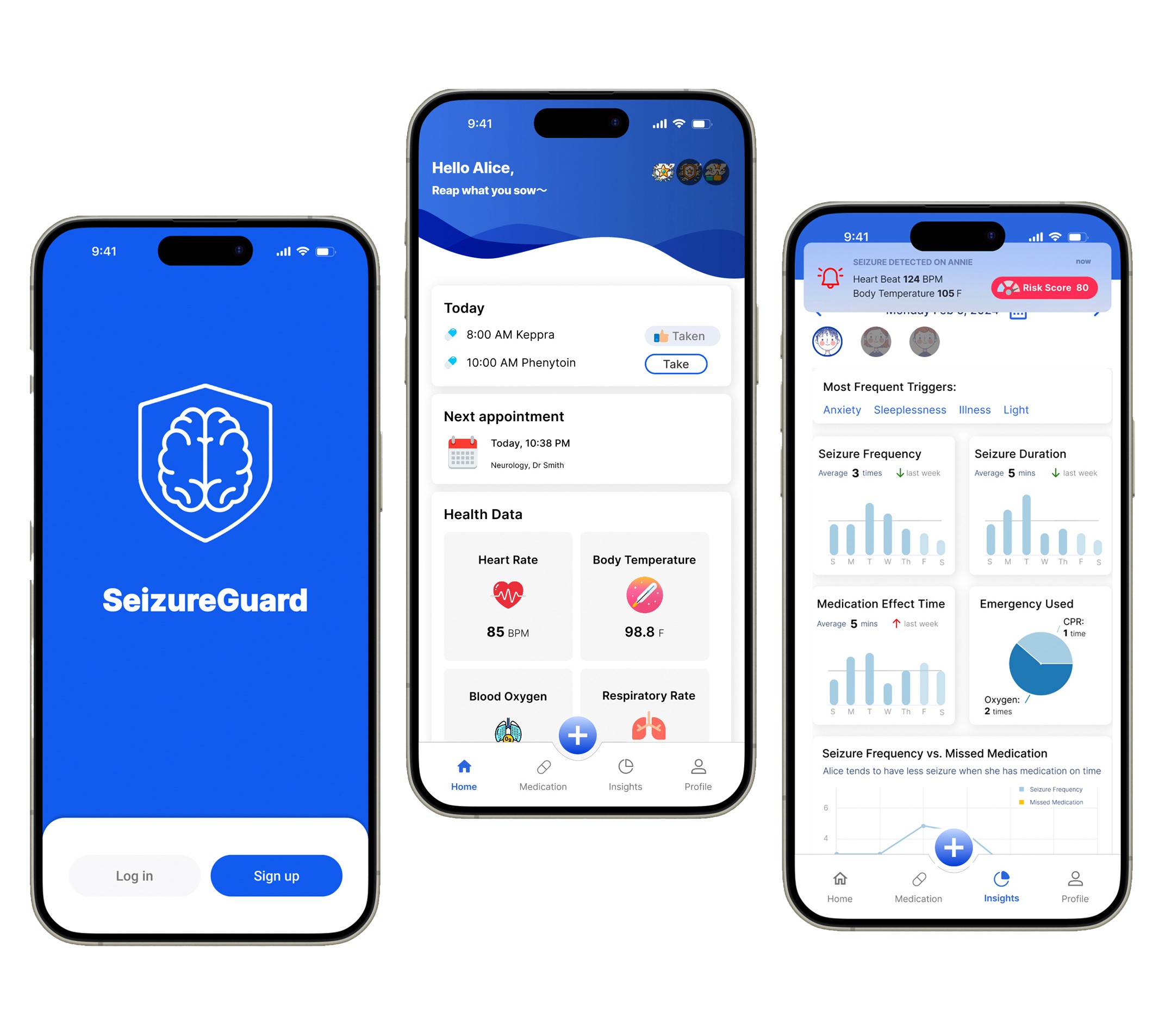


Role
UX/UI Designer
UX Researcher
Skills
User Research
Interaction Design
UX Designer
Visual Design
Timeline
24 Weeks
Prototype
Mobile View
Why Epilepsy
Why Epilepsy
Why Epilepsy
Epilepsy, affecting around 50 million people globally and 1.2% of the U.S. population, is one of the most common neurological conditions. Despite its prevalence, there's a significant lack of apps designed for epilepsy patients and caregivers, underscoring a crucial need in healthcare technology.
Epilepsy, affecting around 50 million people globally and 1.2% of the U.S. population, is one of the most common neurological conditions. Despite its prevalence, there's a significant lack of apps designed for epilepsy patients and caregivers, underscoring a crucial need in healthcare technology.
Epilepsy, affecting around 50 million people globally and 1.2% of the U.S. population, is one of the most common neurological conditions. Despite its prevalence, there's a significant lack of apps designed for epilepsy patients and caregivers, underscoring a crucial need in healthcare technology.
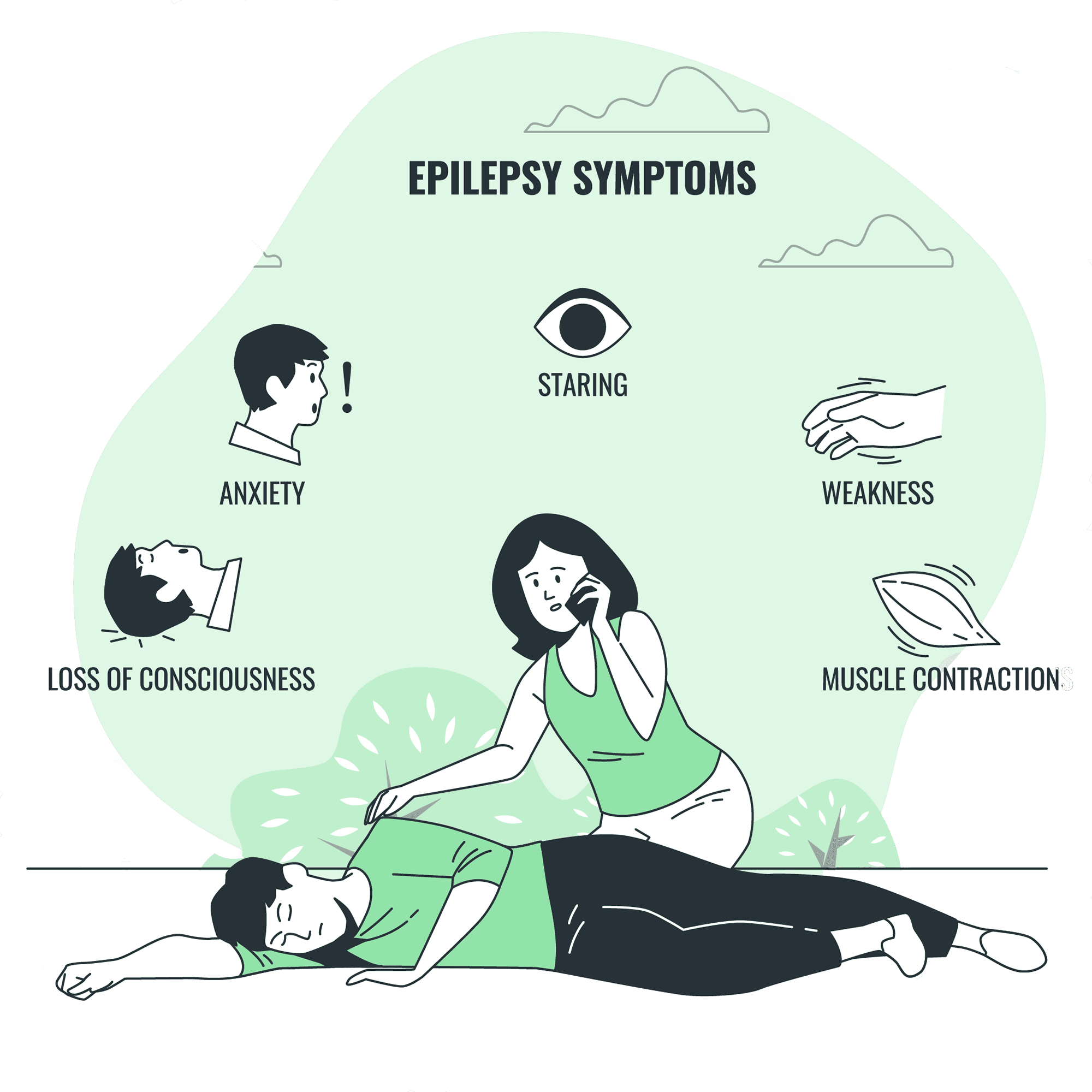


My Goal
My Goal
Exploring enhanced methods to enable patients and caregivers to accurately track and record seizure episodes through simplified procedures.
Exploring enhanced methods to enable patients and caregivers to accurately track and record seizure episodes through simplified procedures.
Does what we assume users want align with their actual desires?
We need more research…
Discovery
EARLY INSIGHTS
We carried out secondary research by reviewing scholarly articles on Google Scholar, enhancing our comprehension of epilepsy. Additionally, we conducted a survey to gather insights into the everyday challenges faced by epilepsy patients and their caregivers.


Managing epilepsy effectively requires significant data and time
Managing epilepsy effectively requires significant data and time
Epilepsy management is challenging due to seizure unpredictability, finding effective medication, and identifying triggers. It involves detailed data collection, often via seizure journals, which is complicated by the need for precise timing and information, making accurate documentation and recall difficult for patients and caregivers.
Epilepsy management is challenging due to seizure unpredictability, finding effective medication, and identifying triggers. It involves detailed data collection, often via seizure journals, which is complicated by the need for precise timing and information, making accurate documentation and recall difficult for patients and caregivers.
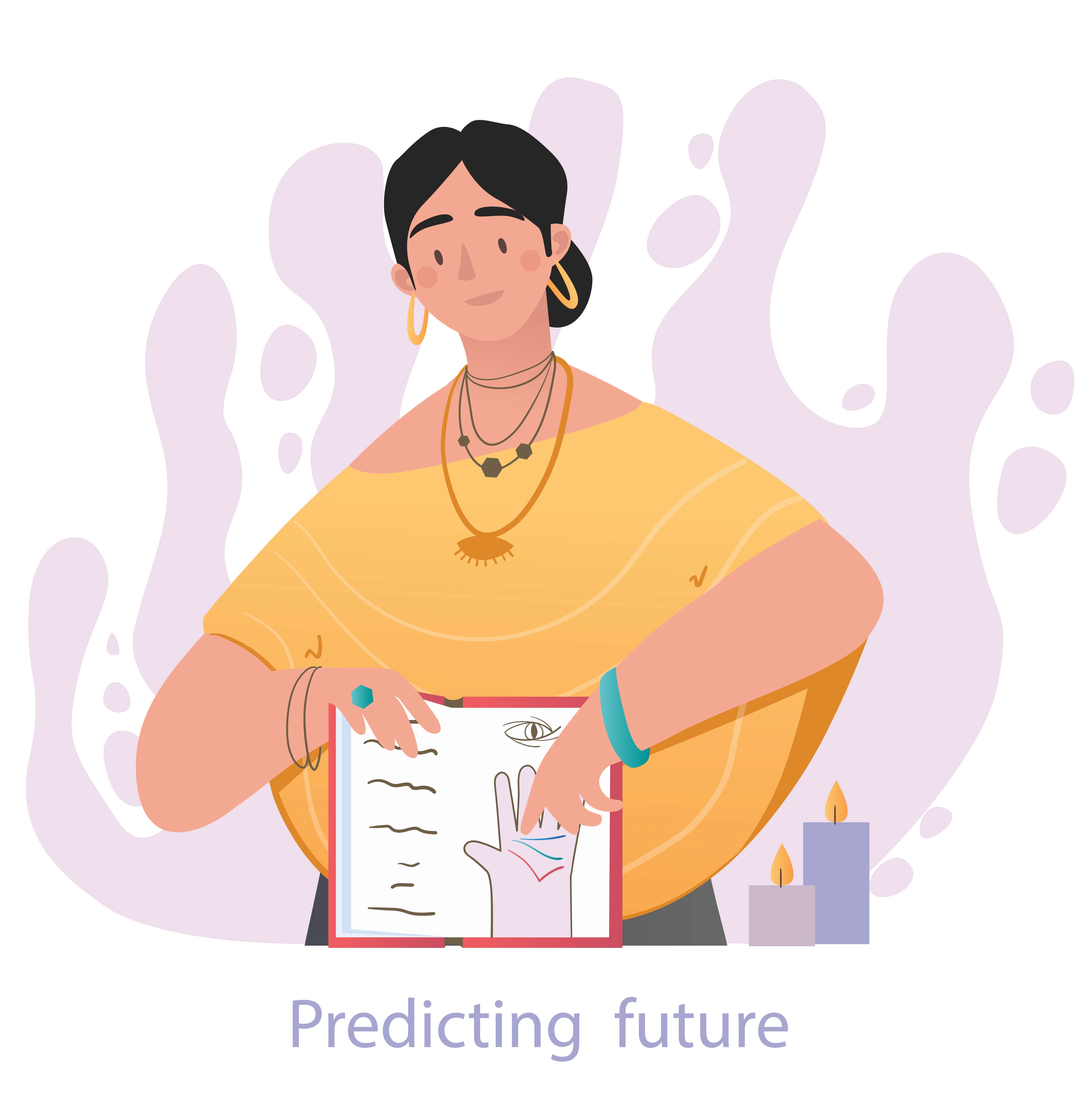

Accurate seizure forecasting necessitates considerable expertise and ongoing monitoring
Accurate seizure forecasting necessitates considerable expertise and ongoing monitoring
For epilepsy patients dependent on support, especially those new to their diagnosis, constant vigilance from caregivers is crucial. The night poses significant risks, as seizures can be more dangerous. Caregivers typically depend on any noises from patients as alerts, allowing them to verify the patient's state. This necessity often results in restless nights for caregivers, impacting their sleep.
For epilepsy patients dependent on support, especially those new to their diagnosis, constant vigilance from caregivers is crucial. The night poses significant risks, as seizures can be more dangerous. Caregivers typically depend on any noises from patients as alerts, allowing them to verify the patient's state. This necessity often results in restless nights for caregivers, impacting their sleep.
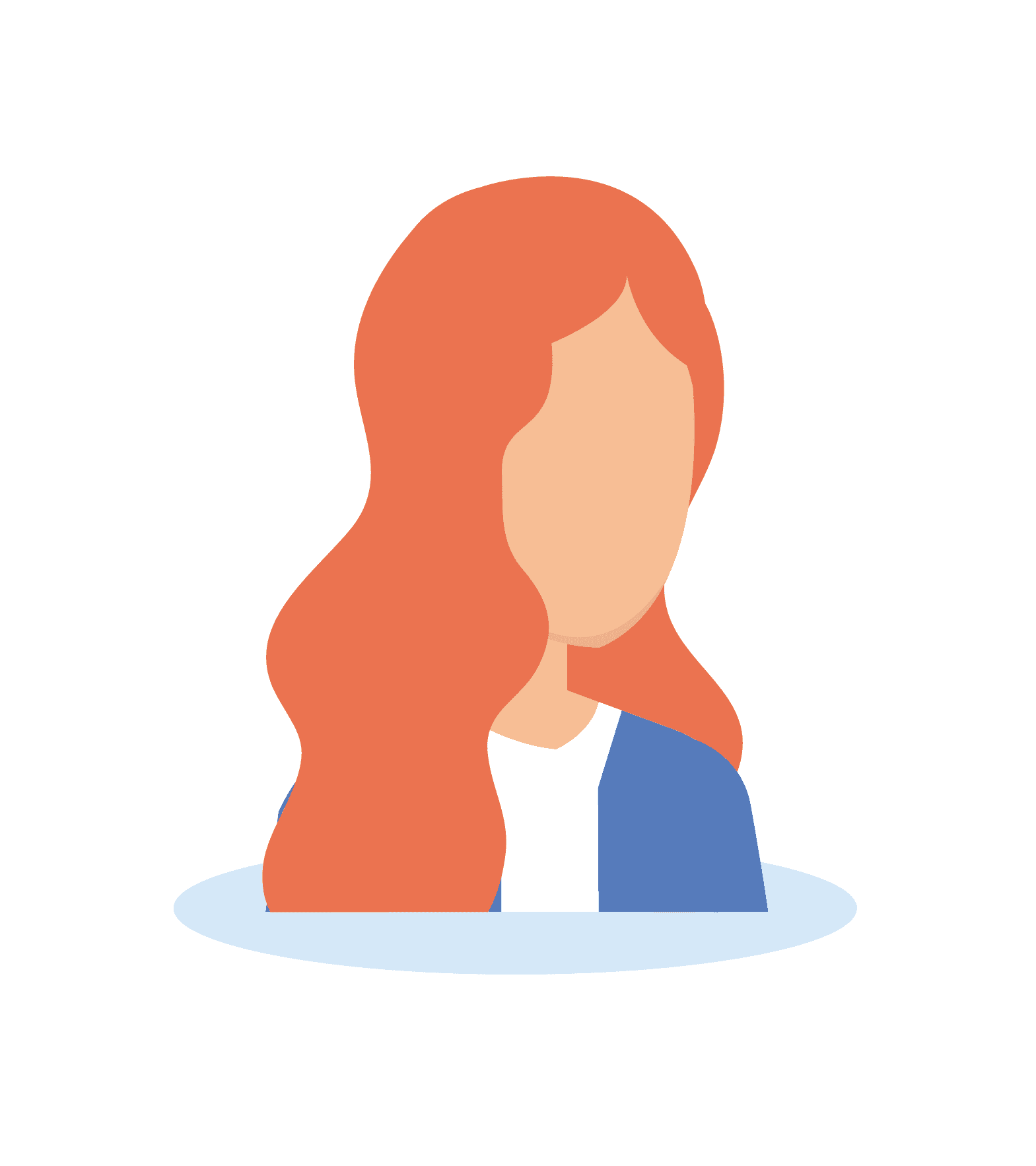
Caregiver #1
"There's always worry like when she needs up the dosage in her pill, we keep a very close eye on her"

Caregiver #2
"My grandmother has had small seizures ever since she was a stroke victim. It's hard to check on her nightly and know she's okay."
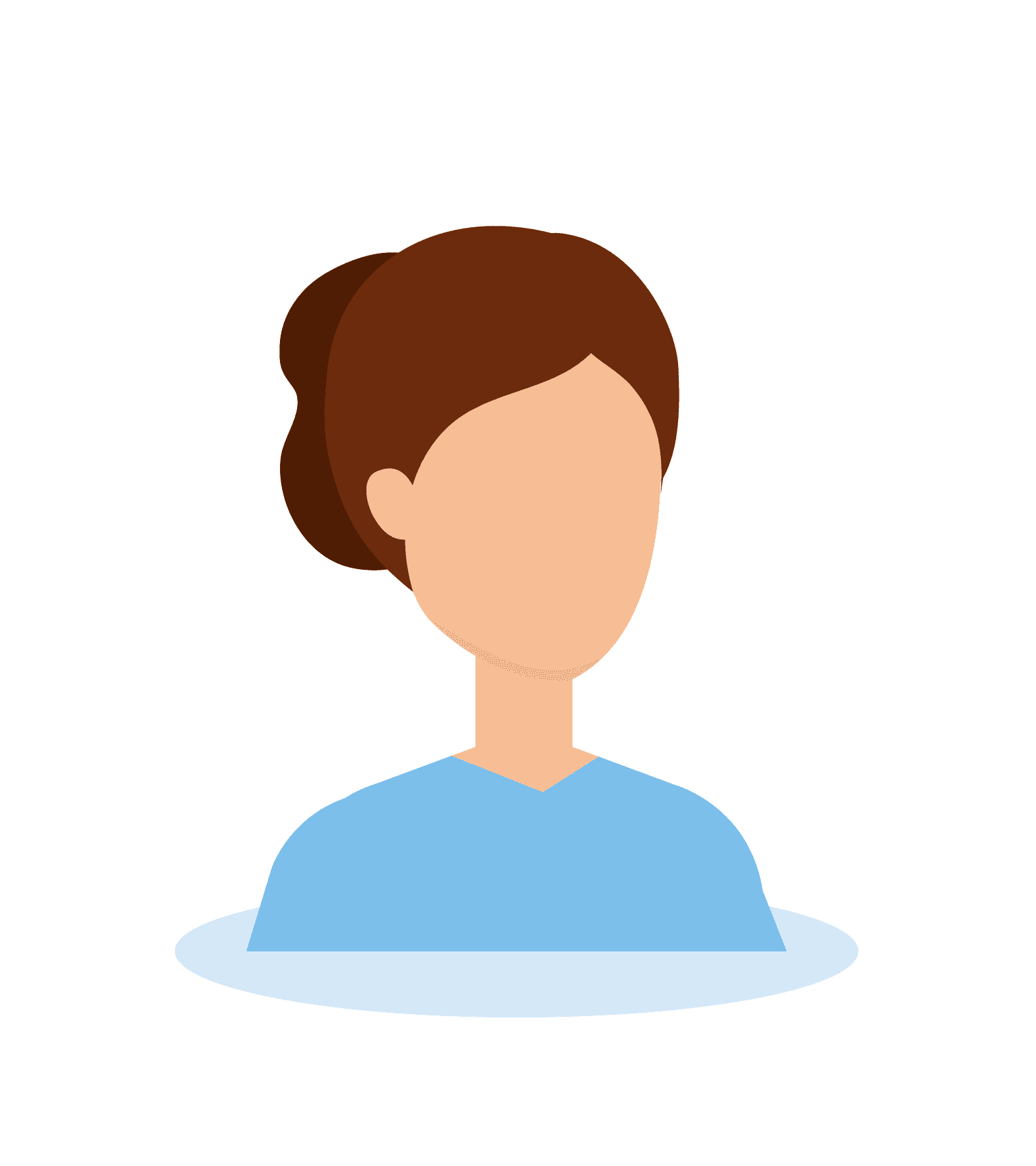
Caregiver #3
"I'm a caregiver for someone with epilepsy and I get a lot of anxiety because they sometimes lose consciousness during seizures which is very scary!"

Patient #1
"I wish I could to spending time away from home doing normal things for 10 minutes/an hour/all day/multiple days without worrying about or having an actual seizure."
DEEPER INSIGHTS
Given that our survey predominantly featured caregiver responses, we aim to broaden our understanding with patient perspectives, recognizing that surveys alone may not fully capture users' needs. To address this, we conducted in-depth interviews with 13 participants, comprising 7 caregivers and 6 patients, to gather more comprehensive insights. From the interviews, we found the following key insights.
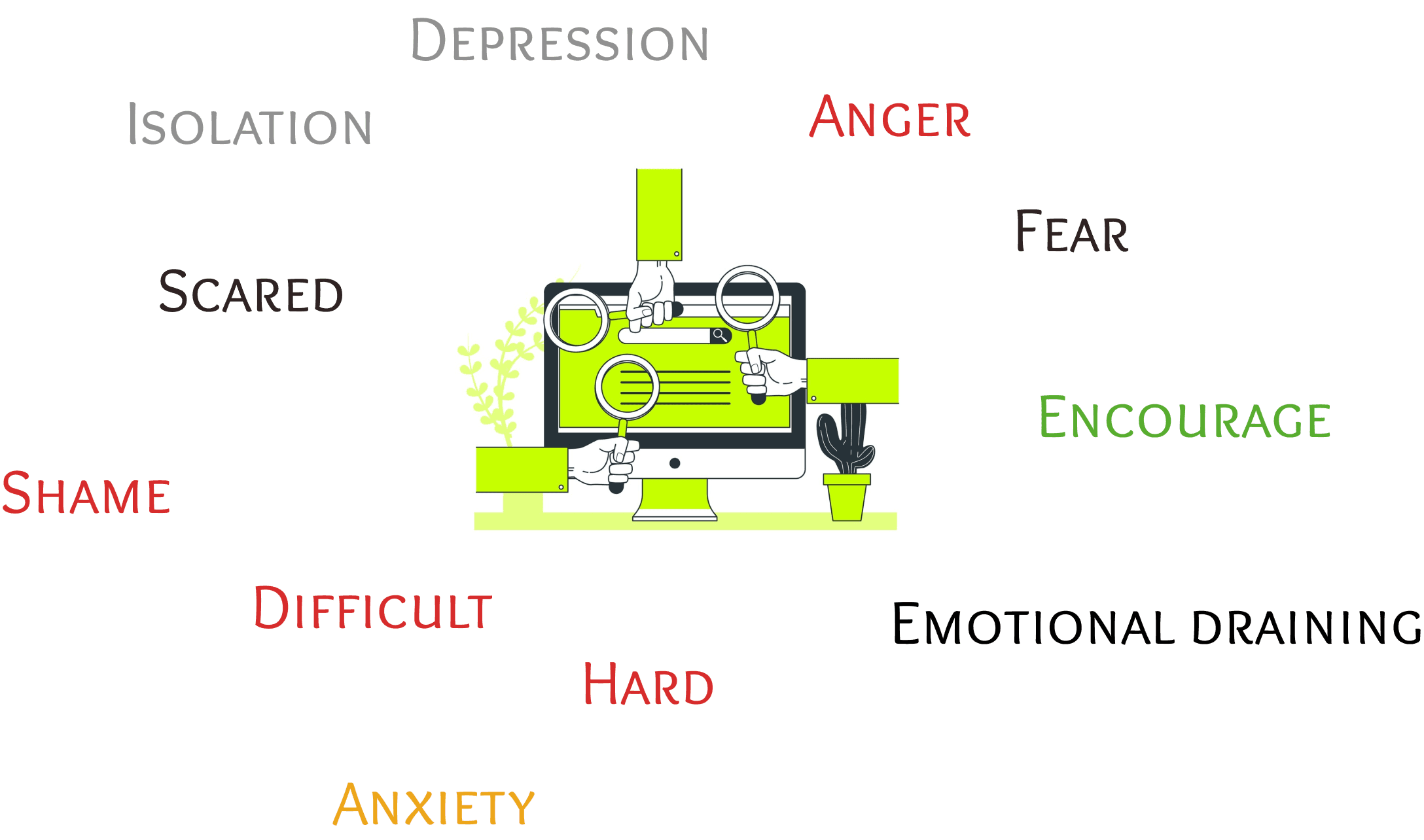
Both patients and caregivers need emotional support and positive feedback
The image on the left displays the keywords extracted from the in-depth interviews.

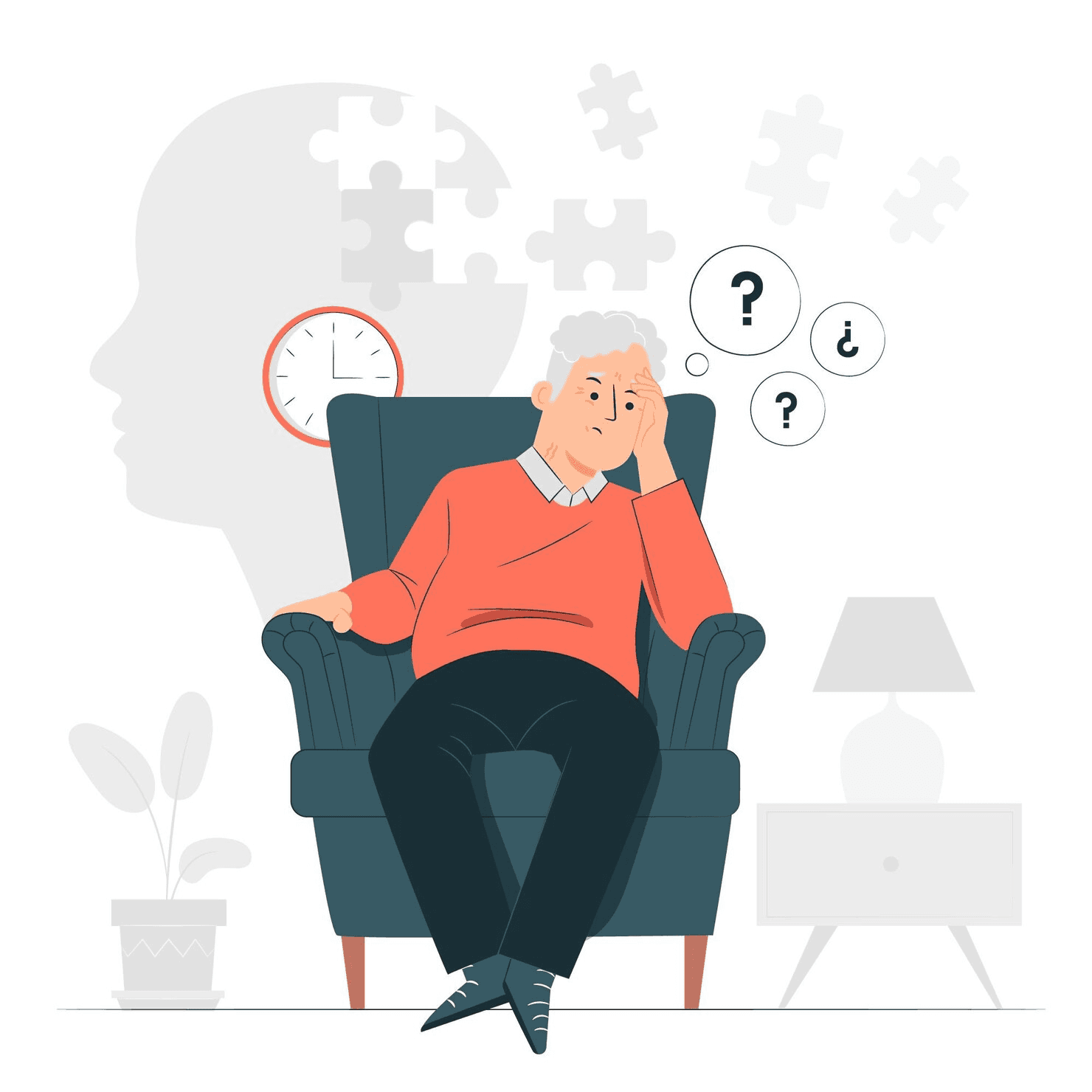
Recalling the specifics of a seizure episode is challenging

Patient #2
"I'm sorry that I cannot offer more details about my seizure episodes. The experience was too fearful, and recalling it revived those fears."

OUR USERS
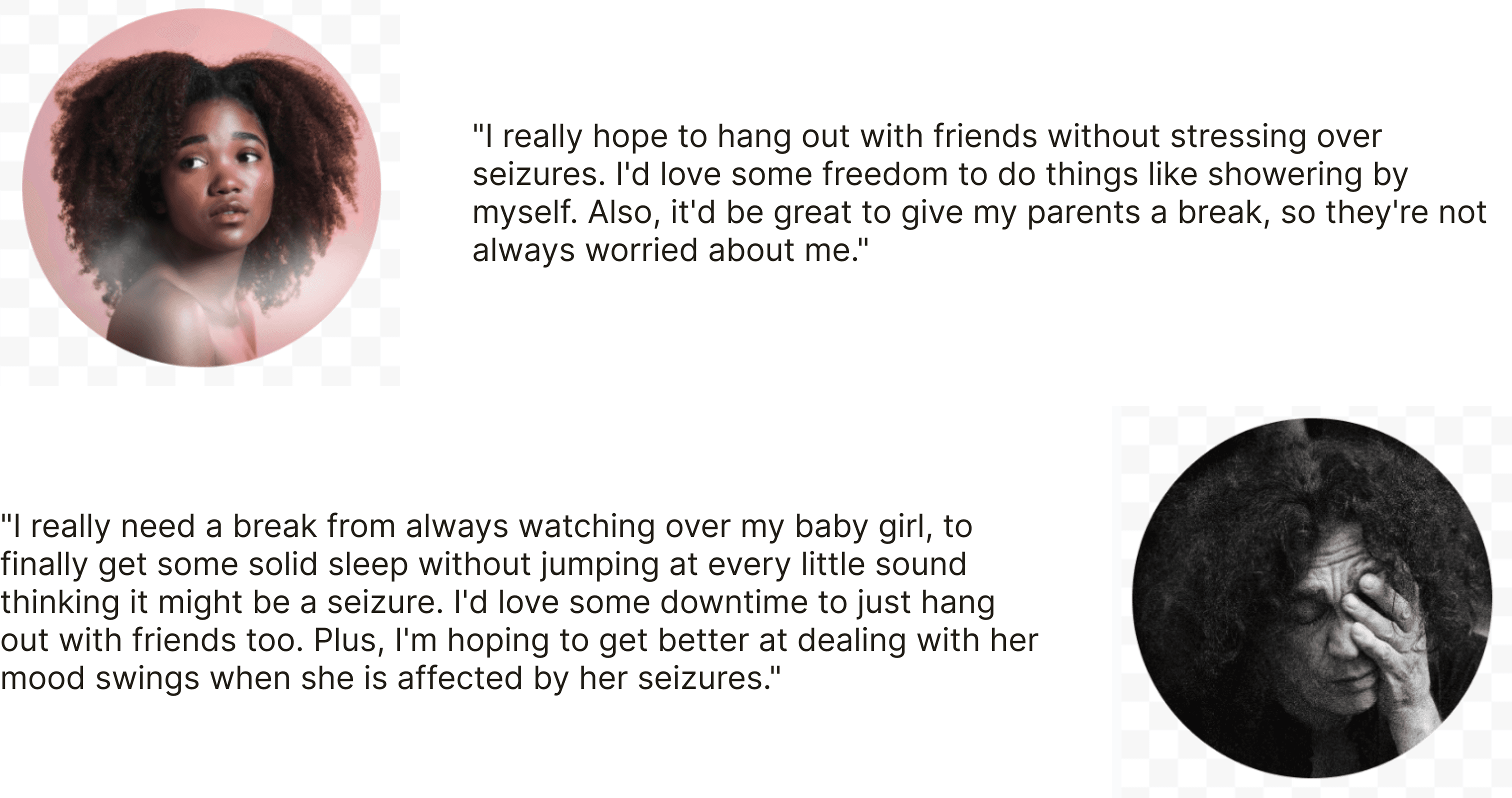


OUR COMPETITOR
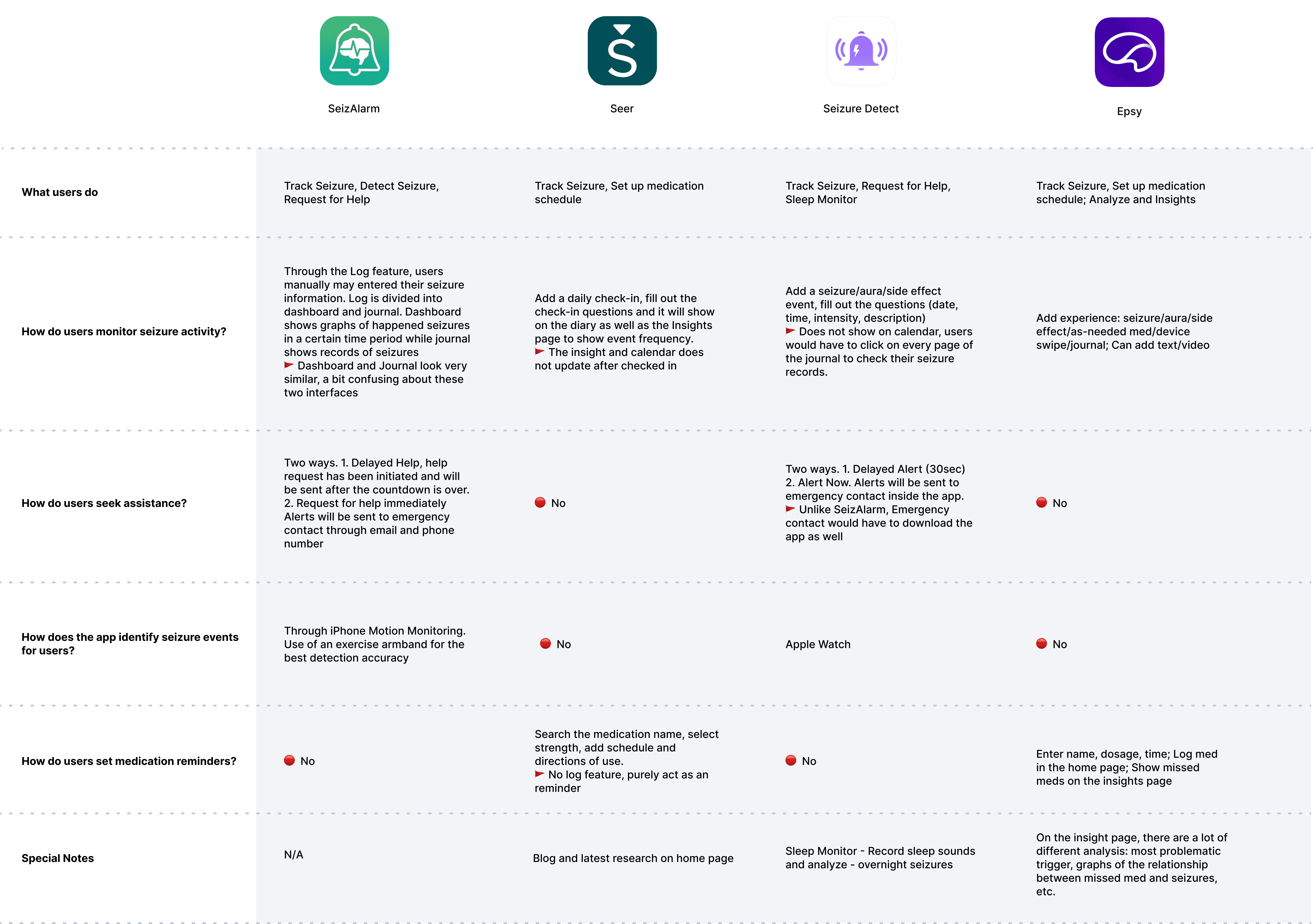


How Might We
facilitate easy tracking and recording of seizure episodes for patients and caregivers through streamlined procedures, while alleviating their emotional stress?
Proposed Solutions
Given that our survey predominantly featured caregiver responses, we aim to broaden our understanding with patient perspectives, recognizing that surveys alone may not fully capture users' needs. To address this, we conducted in-depth interviews with 13 participants, comprising 7 caregivers and 6 patients, to gather more comprehensive insights. From the interviews, we found the following key insights.

Recalling the specifics of a seizure episode is challenging

Patient #2
"I'm sorry that I cannot offer more details about my seizure episodes. The experience was too fearful, and recalling it revived those fears."

Copy Paste
from Figma
Copy Paste
from Figma
Copy Paste
from Figma
Install the plugin and convert your designs to a responsive site.
Start with Site Templates
Start with Site Templates
Start with Site Templates
Browse dozens of templates. Click, duplicate, customize.
Get Started
Learn More
Discovery
EARLY INSIGHTS
We carried out secondary research by reviewing scholarly articles on Google Scholar, enhancing our comprehension of epilepsy. Additionally, we conducted a survey to gather insights into the everyday challenges faced by epilepsy patients and their caregivers.


Managing epilepsy effectively requires significant data and time
Epilepsy management is challenging due to seizure unpredictability, finding effective medication, and identifying triggers. It involves detailed data collection, often via seizure journals, which is complicated by the need for precise timing and information, making accurate documentation and recall difficult for patients and caregivers.


Accurate seizure forecasting necessitates considerable expertise and ongoing monitoring
For epilepsy patients dependent on support, especially those new to their diagnosis, constant vigilance from caregivers is crucial. The night poses significant risks, as seizures can be more dangerous. Caregivers typically depend on any noises from patients as alerts, allowing them to verify the patient's state. This necessity often results in restless nights for caregivers, impacting their sleep.
DEEPER INSIGHTS
Given that our survey predominantly featured caregiver responses, we aim to broaden our understanding with patient perspectives, recognizing that surveys alone may not fully capture users' needs. To address this, we conducted in-depth interviews with 13 participants, comprising 7 caregivers and 6 patients, to gather more comprehensive insights. From the interviews, we found the following key insights.


Both patients and caregivers need emotional support and positive feedback
The image above displays the keywords extracted from the in-depth interviews.




Recalling the specifics of a seizure episode is challenging


Patient #2
"I'm sorry that I cannot offer more details about my seizure episodes. The experience was too fearful, and recalling it revived those fears."


Given that our survey predominantly featured caregiver responses, we aim to broaden our understanding with patient perspectives, recognizing that surveys alone may not fully capture users' needs. To address this, we conducted in-depth interviews with 13 participants, comprising 7 caregivers and 6 patients, to gather more comprehensive insights. From the interviews, we found the following key insights.
Given that our survey predominantly featured caregiver responses, we aim to broaden our understanding with patient perspectives, recognizing that surveys alone may not fully capture users' needs. To address this, we conducted in-depth interviews with 13 participants, comprising 7 caregivers and 6 patients, to gather more comprehensive insights. From the interviews, we found the following key insights.
DEEPER INSIGHTS
DEEPER INSIGHTS
We carried out secondary research by reviewing scholarly articles on Google Scholar, enhancing our comprehension of epilepsy. Additionally, we conducted a survey to gather insights into the everyday challenges faced by epilepsy patients and their caregivers.
We carried out secondary research by reviewing scholarly articles on Google Scholar, enhancing our comprehension of epilepsy. Additionally, we conducted a survey to gather insights into the everyday challenges faced by epilepsy patients and their caregivers.
Discovery
EARLY INSIGHTS
EARLY INSIGHTS


Both patients and caregivers need emotional support and positive feedback
Both patients and caregivers need emotional support and positive feedback
The image on the left displays the keywords extracted from the in-depth interviews.
The image on the left displays the keywords extracted from the in-depth interviews.




Recalling the specifics of a seizure episode is challenging
Recalling the specifics of a seizure episode is challenging


Patient #2
"I'm sorry that I cannot offer more details about my seizure episodes. The experience was too fearful, and recalling it revived those fears."


